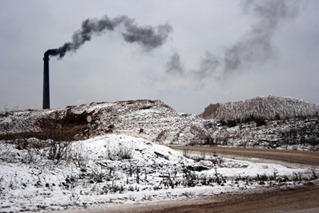Everything that Burning Coal Leaves Behind
by Debbie Oudiz, ANCHORAGE DAILY NEWS, March 24, 2011
 Coal is just black rock, seemingly harmless. At least that is how the coal interests were portraying coal recently to school kids in Seward by handing out treat bags with coal and pieces of "candy coal." It is akin to the tobacco companies marketing to our children with Joe Camel and candy cigarettes. "Familiarity" does not mean "harmless," and the results can have long-term devastating health and environmental outcomes. Our children are too young to sort out the coal facts, so it is up to us to make sense out of the long-term consequences of coal.
Coal is just black rock, seemingly harmless. At least that is how the coal interests were portraying coal recently to school kids in Seward by handing out treat bags with coal and pieces of "candy coal." It is akin to the tobacco companies marketing to our children with Joe Camel and candy cigarettes. "Familiarity" does not mean "harmless," and the results can have long-term devastating health and environmental outcomes. Our children are too young to sort out the coal facts, so it is up to us to make sense out of the long-term consequences of coal.
Coal is not harmless. Coal gets burned and all those parts that make up coal get changed, released and distributed. The short list includes carbon dioxide (CO2), polyaromatic hydrocarbons (PAHs), breathable particulates and mercury — not to mention the devastation of the land that occurs when coal is stripped out of the earth. I am not an alarmist. I am an environmental toxicologist ,and I have spent the last 30 years involved with the cleanup of hazardous waste sites: sites where people have been unnecessarily exposed to toxic chemicals in their soil, water, air.
Once coal is burned the real challenges begin. Let’s look at mercury. Mercury is a heavy metal, which means that while it may combine with other chemicals, it is never going away. In addition, mercury belongs to a special group of chemicals in the toxicology world. Unlike a number of chemicals that toxicologists only suspect may hurt people, we know that mercury affects the brains of unborn children, produces birth defects, and damages the central nervous system and kidneys in people of any age. We know that exposures to mercury can have long-lasting and permanent health effects. We have witnessed the devastating effects in many people, including children, and we know that our unborn children are the most vulnerable and can be harmed.
When coal gets burned, mercury is released into the air and can drift for thousands of miles. In fact, mercury from coal burned in China (the proposed destination of Chuitna coal) crosses the Pacific and into Alaska. Have you ever noticed the brown cloud/haze from the west? I have, far too often. In the Arctic, mercury stays suspended in the air, then drops in "pulses" to the Earth and oceans. Once mercury settles out of the air, it washes into creeks, streams, and eventually the bays, inlets and ocean. Mercury accumulates in the sediments and is readily taken up by fish. We all know that bigger fish eat the smaller fish and the mercury ends up concentrated in the larger fish and animals. [Read rest of story]


